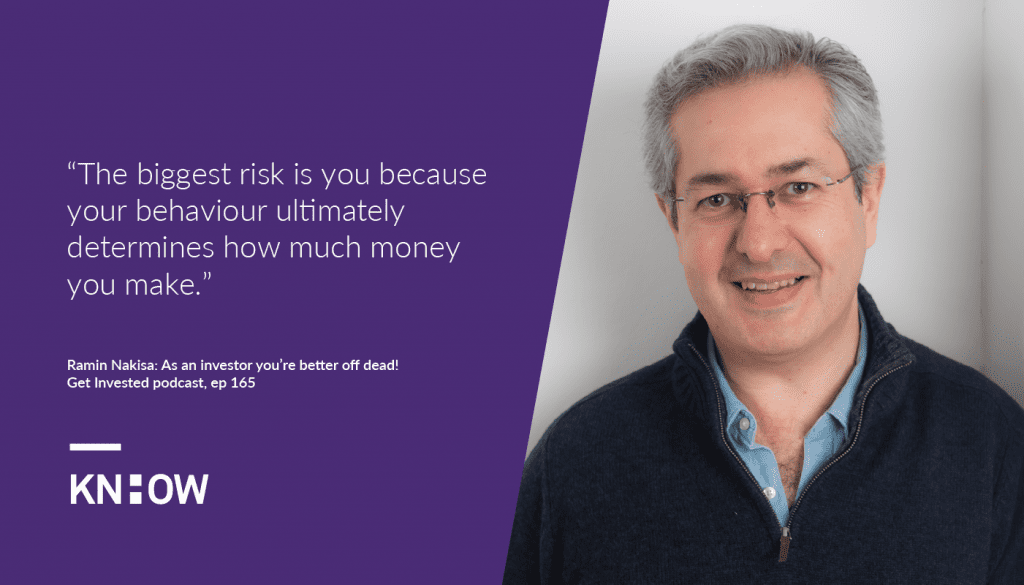Investment expert Ramin Nakisa says investors need to control their behaviour and aim to simply monitor their investments, rather than be actively involved.
It is often said that ‘less is more’, and the UK-based investment coach, teacher and author believes investing is no different.
In an interview with KnowHow founder Bushy Martin on the Get Invested podcast, Ramin explained that the most successful investors take the back seat and keep the process simple.
He said the best way to achieve this is to understand your own psychology and steer clear of ‘number crunching’ and obsessing over daily trends.
“You don’t need to be good at maths or even intelligent to do well at investing,” Ramin said.
“It’s more to do with discipline than it is about being smart, and really having self-control and a long range approach to investing and really keeping at it for a long period of time. And that takes huge discipline,” he said.
Ramin said one of the biggest misconceptions in investment is that investors need to be actively involved to achieve results, and he experienced this first-hand at the start of his journey, when his best performing investment was the one he didn’t do anything with.
Ramin said the right strategy is to ‘play dead’.
“I did all the wrong things and I made some terrible investments. But then I learned from that and just kept it simple, and that worked fairly well because I didn’t do anything with the portfolio … and that was the secret – the fact I’d ignored it,” he said.
“So don’t fiddle. The ideal investor is a dead investor. If you can pretend to be dead, then that’s a good way to do it.
“I think having a sensitivity to big changes in the market and having these periods of intense activity when you capitalise on the opportunities is important. And then having long periods of doing nothing is absolutely ok, and keeping FOMO at bay – which is this Fear Of Missing Out – which makes people desperate to invest.
“I speak to quite a lot of high net worth investors now and many of them are in a position where they’ve sold a business, they’ve got millions to invest and it’s in cash and they feel bad about it because they think, ‘well, I should be fully invested, all these investment banks are coming up to me very kindly offering to invest my money for me’. And I just tell them, look, you don’t need the money and there’s no rush to invest. Take your time because you can afford to invest when things are much better in terms of an entry point when prices are low. So I think that Fear Of Missing Out forces is to kind of try and fiddle.”
But how can you identify whether you’re becoming too involved in your investments? Well, if it feels like a job, you’re doing it wrong.
“Really you shouldn’t be spending too much time on investment. There are certain periods of times when you should be focusing on what’s going on, and those are the big sell offs when nobody else wants to be involved, and those are the real opportunities. But most of the time, you should just be fairly hands off and just get on with your life,” Ramin said.
“You should have realistic expectations about investment. An investment doesn’t make you rich. Investment keeps you rich, and ultimately, it takes a long time. And it should be boring. It should be just something you do as part of your routine.”
Bushy added: “If an investment is creating a job for me, it’s not an investment. I want my investments to fund my lifestyle so I can put my energy into the things I actually enjoy doing outside of that. Monitor it, sure, but not to be so active in it that it’s actually replacing my employment income with time I need to spend managing the investments.”
A key part to achieving this goal and mindset is truly understanding your own behaviour and what triggers a response in you. This is particularly crucial when confronted with ‘news stories saying that the world is ending’.
“The biggest risk is you, because your behaviour ultimately determines how much money you make. And if you have the wrong kinds of behaviour, then it’ll be a disaster,” Ramin explained.
“I think people talk about understanding things like volatility and correlation, but what’s much more important is to understand your own psychology and to master your own behaviour and to overcome your own cognitive biases, whatever those are. And we all have them.
“We’re very ill-suited to being investors. If we sense a sell off our natural reaction is to run away from it and to take risk off the table when you should actually be running towards the fire. And of course, evolution has told us that you don’t run towards fire. So you’ve almost got to be like a marine. They truly drill marines to run into enemy fire, and it takes a special kind of mindset to do that.”
Listen to the full interview here.
Want to Know How you can build wealth with the help of leading, qualified experts? Talk to the team at KnowHow, now.




